- Home
- J. B. Simmons
Light in the Gloaming (The Gloaming Book One) Page 2
Light in the Gloaming (The Gloaming Book One) Read online
Page 2
“A living thing seeks above all
to discharge its strength—
life itself is will to power;
self-preservation is only
one of the indirect and
most frequent results.”
The banquet had more food than the hundreds gathered could eat. There were baked turkeys, lamb shanks, and fresh cut salmon fillets as long as a man’s leg. At the center of the feast was a tower of cake, dripping chocolate as servants passed slices through the palace’s grand hall. The guests gobbled it down, but their anxious gazes never ventured far from the newly crowned Prince of Valemidas.
Tryst sat at the head of the hall, with two women at his sides. He gave the most prized position on his right to his only full sister, Ravien. She was like the prince mirrored as a woman, with a high brow and precise features. She could have been his twin if not for being born a year before him. Many now mistook her as an ornament to the prince, like a dark orchid blooming in his shadow. She looked the part, but her ambitions exceeded her brother’s.
On the prince’s left was his younger half-sister, Lorien. She wore the trained smile of a princess. She had the prince’s strong features, with softer lips and eyes. Amber curls framed her regal face. Her long black gown graced the ground and dipped to show a royal pendant at her chest. The gown suggested that a slip of the fine silk off her shoulder would leave her naked before the banquet hall. She might have worn it because she felt like she was hanging on by less than the fabric was. She wore no other jewelry or color. Let them take the lack of coverage as a sign of honesty and sincerity, she thought. Little of that existed elsewhere in this hall.
More than a few guests saw Lorien as an ominous presence. She was like a funeral pyre that remained unburned, a reminder of the prince who had disappeared months ago, the prince she had loved. She wondered whether her half-brother honored her for her loss, with a hope that she would change, or whether he kept her as a prisoner because of her anger and opposition to her own blood. Certainly no one could be watched more closely than a guest of honor.
The servants began to pound the huge gongs in the four corners of the hall. The sound echoed off the marble floors and columns, muting everything else until Tryst stood. Applause erupted for the new prince, who held his arms out to receive the praise.
Lorien could not deny the power of his figure. It was wrong for him to be in that position, she thought, no matter how naturally he filled it. She pulled her eyes away and glanced across the room. The vast hall always took her breath away. The glow of chandeliered candles lit the tall columns and the guests’ faces. All of them were transfixed by Tryst.
The full high court was in attendance—the patriarchs of the fifty noble houses. Those patriarchs had held the power, by majority, to nominate someone else after Tryst betrayed Andor. But they had bent to Tryst’s will and put him to a vote of the people, where his charisma had carried the day.
If only someone had evidence of what he had done to Andor, the people might have turned against Tryst. Instead, they had elected him to be prince for life, as was the Valemidas custom. Now he could be removed only by death, disappearance, or a vote against him by forty-five of the fifty white-haired nobles. With the nobles’ ancient grudges and factions, Lorien knew that was not going to happen, especially not with House Talnor, one of the strongest, in Tryst’s camp.
Tryst had given the patriarchs positions of honor tonight, but not as much honor as they had wanted. They and their guests sat clustered at round tables near the prince’s head table, where newly sworn knights flanked Tryst and his sisters. It was against custom to seat military with greater honor than the nobles.
Lorien continued surveying the crowd of nobles and knights and merchants until she noticed a small, foreign man lurking in the corner nearest to Tryst. Her fists clenched as she recognized him as Ramzi. He stood out as a Sunan with a small symbol tattooed on his right temple, close to his exotic eyes. He was watching Tryst and nodding like a puppet master whose head rises and falls as his puppet dances.
He was the advisor who had fueled her brother’s rise. Over the years he had taught Tryst about the march of history towards an ideal. The ideal for Ramzi was a fanatic devotion to a god who would reward him in the afterlife for imposing order. It seemed that neither Ramzi nor his god cared in the slightest if the men leading the march of history trampled over every human being in their path.
She forced the evil advisor out of her mind.
Her focus had to be on Tryst. She found it hard to believe that she shared a father with the man. He was lean and tall, but by no means the tallest man in the room. His height was perhaps his only aspect that did not dwarf others. Whatever he lacked in size, he made up for in angles. It was if every line of his body directed the eye upward to the steep angles of his face. From the sharp point of his chin to his wide cheekbones, his face was like an elongated acorn, eerily well-suited to holding a crown. His posture was earned in action and demanded respect.
Unlike most princes in history, Tryst had not changed his appearance with his rise to power. Lorien might have admired the independence, but instead she counted it as another drop in the pool of his arrogance. As always, he wore tight-fitting charcoal trousers and a high-collared white shirt. The stark style was punctuated by ornate silver bracers on his lower arms and by the silver plating that hid almost all the black of his boots.
His attire contrasted with the city around him. In Valemidas, the great capital, everything had color, and this banquet was the height of that radiant style. Servants wore rainbow-striped tunics to be sure they did not fail to include the colors of any of the five most powerful noble houses. The ladies wore shimmering reds and purples and greens and blues. The patriarchs followed suit in their own distinct colors and patterns.
In the middle of that kaleidoscope, Tryst stood in his black, white, and silver. He wore his only colors in two ancient relics, a diadem and a sword that were passed down to every Prince of Valemidas. The diadem was made of a light, strong metal. It clung to his brow and was mostly hidden by his black curls. There was a massive diamond set at the front of the diadem. Next to Tryst’s blue eyes, any other jewel would be a pittance. But this brilliant stone fueled his glare and matched it. It was like a third eye with the same color of pale blue.
The other relic was a sword known as Zarathus. Made of the same hard metal as the crown, the sword was said to have been forged for Valemidas’ founder. It passed from prince to prince, and power followed in its wake. At Tryst’s side, it looked darker than Lorien remembered, as if the sword had taken on a different personality than when it had been in Andor’s hands. The rubies in the hilt seemed to mold to Tryst’s fingers, giving him perfect control over the long blade.
Tryst stood poised with these two relics declaring his position. He continued to hold out his hands like he was consuming the hall’s uproar—as naturally as his guests had consumed the feast.
He slightly lifted his head, letting the light of a thousand candles dance across his face. The cheers roared on. What felt like a frozen eternity to Lorien was perhaps a minute. As the applause began to fade, Tryst stepped onto the head table and thrust Zarathus into the air above him. The crowd cheered again.
Lorien shuddered in disgust at what her brother had become. He had conspired from the side of Andor, as one of his highest knights, to steal the throne. No one knew quite what or how it happened, but one morning Andor was gone and Tryst was in his place. Despite endless searching and questioning, no one had uncovered any proof of what happened. Andor’s body had not been found, and most assumed he had been killed. As that mystery swirled, Tryst had convinced a few powerful nobles to help him. He was shrewd enough to know that controlling them would open the path to the throne. Maybe he and Ramzi had used threats or promises about stopping the disappearances among the noble houses.
Many had gone missing after Tryst took control. Children were taken from their parents, and the city’s list of crimes grew longe
r by the day. It seemed dangerous to say anything against Tryst. Those that would not bear his heavy yoke suffered the consequences. Some had fought back when the best young boys were taken from their homes for a life of military training. The resistance had waned after those who fought the loudest were not seen again. Rumors said Ramzi administered a dungeon worse than death, but Lorien had not been able to learn more. Every rumor of Ramzi seemed cloaked in smoke and myth.
If the people could not rid themselves of Ramzi and Tryst, then the nobles would have to do it. They were the ones who had upheld tradition over the generations. If enough of the houses united their private guards, maybe under the command of Sir Justus Davosman, they might have enough power to withstand Tryst. Not for long, though, because his forces were growing stronger by the day.
Everyone had failed from the beginning with Tryst. After his and her father had died and left Tryst a parentless boy, only Ravien and Ramzi seemed to have any influence over him. Others praised him, blinded by his talents. Even when he rose to Andor’s council of knights, no one suspected this.
Looking out upon the banquet from her seat of honor, Lorien stared truth in the face. This was Tryst’s coronation and Andor was gone. But she would not give up the fight. Her life was nothing without the prince she loved, except to bring justice to the prince she detested.
Chapter 3
THE STAB OF SURVIVAL
“Two are better than one,
because they have a good
reward for their toil.
For if they fall, one will
lift up his fellow.
But woe to him who is
alone when he falls
and has not another
to lift him up.”
Time passed quickly as Lucian and I worked on a plan for escape in the dark cellar. I was thankful for the company, even though we ate through my meager stockpile of food in short order. He was more vulnerable to his stomach’s demands, not being accustomed to real hunger. I had explained to him that we were more likely to die fighting for food than from starvation, but he was undeterred.
“If we team up,” he said, “we can handle anything out there. I am healthy, and your skills in battle are legendary.” He touched the wound on his head. “I’ve seen enough to believe it, my prince.”
The title did not fit me as it once had. “We cannot risk it yet,” I replied. “We have a while before the next falling, I can feel it.”
“Let’s just have a look around. Is it not safer outside the central square?” He was not going to disobey, but he was restless.
“Nowhere is safe, not at any time. You have to align your stomach with the rhythm of this city. Endure the initial flickers of hunger until a deeper pain follows. You feel your body beginning to break down, with no energy to think or act. Then, when your body trembles at the pain and yearning, you leave for the Gloaming’s central square, starving and fierce. You end that brutal hunger cycle focused on nothing but food.”
“So you suggest letting this pain build more?” Lucian wrenched. “I am here to serve, but I can hardly take this.” It had probably been a day since we had eaten.
“You must take it, but perhaps we can go out for a brief stretch.” There was some truth to our strength in numbers, and the next falling would come soon enough.
Lucian wanted to see the perimeter of the city, so I led us there. The path that ringed the city was empty and tranquil. It felt good to use my legs.
I ran my hand along the cool wall as we walked together. The wall was unnatural and oppressing, with sheer gray stone reaching to the ceiling high above. Going over the wall was not an option. We had no tools, so breaking through was hopeless. Some men had tried to dig below it. I had seen holes in the ground that went down over ten feet. They were pressed against the wall, sometimes with a pile of bones at the bottom. The diggers probably lost the will to maintain the effort.
Lucian kept floating ideas for escape. Ladders. Holes. I explained why all the possibilities would fail, but I whispered my only remaining hope: “Lucian, the last, desperate option is the box above the main square.”
His face lit up. “You say the square is the beginning and end of life here, so it must be the way to get out of this hell. We could build up the pile of bones and debris under the box. Then you could stand on my shoulders and jump for it.”
“That would be suicide,” I said. “I might reach the box, but it would be sealed shut. For it to work, the box would have to be open, which means men would be falling and fighting for food all around. We would not survive.”
“More bones could be found around this place,” Lucian suggested. “We could form a mountain with them. We could add any other materials we find. Maybe then we could pry open the box with your pole.”
“I have seen men fail at this many times. The falling ground is a lethal place for such work. Someone will think we have food, or new men will fall. We will be attacked. No one lingers there unless he seeks death.”
“Who could possibly care if we were carrying bones around that empty place?” he asked.
“I have learned this the hard way,” I answered. “The square looks empty and unassuming, but everyone who roams carelessly there meets a dire end. Men succumb to senseless violence, driven by their fear and their stomachs.”
“But we would work in silence, when no food is falling.”
“It is the Gloaming,” I said. “You cannot stay in one spot. All we can do is dash through the square for a morsel of food. Perhaps in a hidden corner of this place, we could gather bones, but there in the center, a blink might be enough of a pause to result in ruin.”
“It cannot always be so dangerous. Surely everyone sleeps.”
“Yes, but not at the same time. Have you seen any change in the environment during your stay?”
“I guess not. It has been dark and gray the whole time.”
“It is always dark and gray. It is like a constant ominous storm, marked only by the lightning strikes of decaying matter from the box.”
“There must be safer times to be there. It should not take us long to gather things to stand on. We can do this together. We have to try something. Here you are decaying, but you know Tryst has to be stopped. It is worth the risk.”
Hearing Tryst’s name brought all the hate and bitterness back. “Put that life behind you,” I said. “It cannot be recovered.”
“You can recover, and you can change things. We are not meant for this. We have to get you back to Valemidas.”
My mind drifted out of the Gloaming, to distant memories of my city. I struggled to find the words to respond. I wanted more than anything to be back, but I was afraid that I could no longer help anything in my fallen state.
“I am not what I once was, Lucian. You said so yourself.”
“What I know, my prince, is that the people loved you. And they will love you again. You saved me, and you called me friend. I have seen warmth returning to you already. Even now you would be better than Tryst for the throne. It is rightfully yours, and getting you out of here will be just the begin—”
Ringing was all I heard after that.
Something pounded into my head, and I went down hard.
Lost in conversation, we had been caught off guard. My vision spun as I struggled to my feet.
A blur of iron swung towards Lucian, who was knocked to the ground.
A man rounded on me. Cornered could equal dead.
I could not get the ringing out of my head, nor could I find my weapon. There were three of them closing on me. The first dove at me recklessly. He was skin and bones and incredibly fast. I pressed my back against the wall, slipped to the right of his attack, and used his momentum to slam his head into the stone.
Just as I did, one of the other men kicked my legs out from under me. I fought to stand, but he was on top of me in an instant. His left hand closed around my throat, squeezing. He pulled his right fist back, ready to punch with a fiendish rage.
As my hand tou
ched the metal pole on the ground at my side, calmness entered my pounding head. I was bigger, better, but gasping. I could not breathe.
Suddenly air flooded into my lungs. The man’s body flew to the side, and I swung my pole down at him. His pallor splattered in color. He looked like he had soaked in this place; like me, he must have been here forever.
I sprang to my feet and saw that the three attackers were all down, motionless. Lucian wavered before me, his eyes dim. He had a metal barb plunged into his neck.
I fell to my knees as he did. His life was spilling down his chest. I caught his body as it collapsed, and I laid it down gently alongside the others.
There was no sound, no pulse, when I pressed my ear over his heart. A great weight held my head there while tears filled my eyes and I began to weep. My body shook and my voice broke as it roared out. I mourned for Lucian and more—the sorrows of this horrid existence, and what it had done to him, to me, and to everyone else down here.
After some time, I was able to lift my head and kneel beside his body. I bent down and pulled my hand over his face to close his still eyes.
As I thought of his final moments, thankfulness began to overcome my anguish. Even in the starved and rotten Gloaming, Lucian had brought selflessness into the chaos, putting my life before his own. His last thought had probably been of saving me.
I had counted survival as my best accomplishment, but it counted for nothing on its own. Memories of my earliest days here flooded my thoughts. I had succumbed to carnal instincts in the beginning, angry and starving, and not just for food.
I remembered once walking to the central square with my sanity withering under desperation and rage. There had been dozens of men falling and fighting all around. I had raised my weapon as I walked, challenging them all. Their famished eyes had circled me, and men had charged into my fury. I could still see the face of the first man who had dashed at me. His face had met my metal pole with a smash. Masses had jumped at me, and my violence had exploded against them. I had attacked over and over, trying to obliterate everything around me. The screams had been brutal as I shattered the bones and souls of any man within reach. None of them had been armed, or well-trained. They were probably simple criminals, where I was the fallen prince. It was some cruel ironic justice.

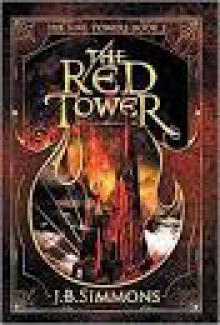 The Red Tower (The Five Towers Book 2)
The Red Tower (The Five Towers Book 2)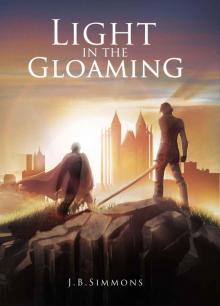 Light in the Gloaming (The Gloaming Book One)
Light in the Gloaming (The Gloaming Book One)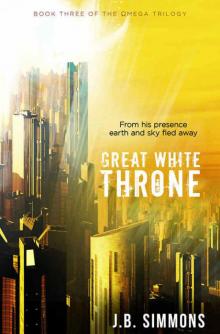 Great White Throne
Great White Throne Unbound
Unbound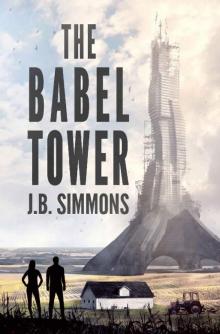 The Babel Tower
The Babel Tower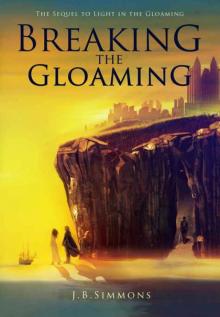 Breaking the Gloaming
Breaking the Gloaming